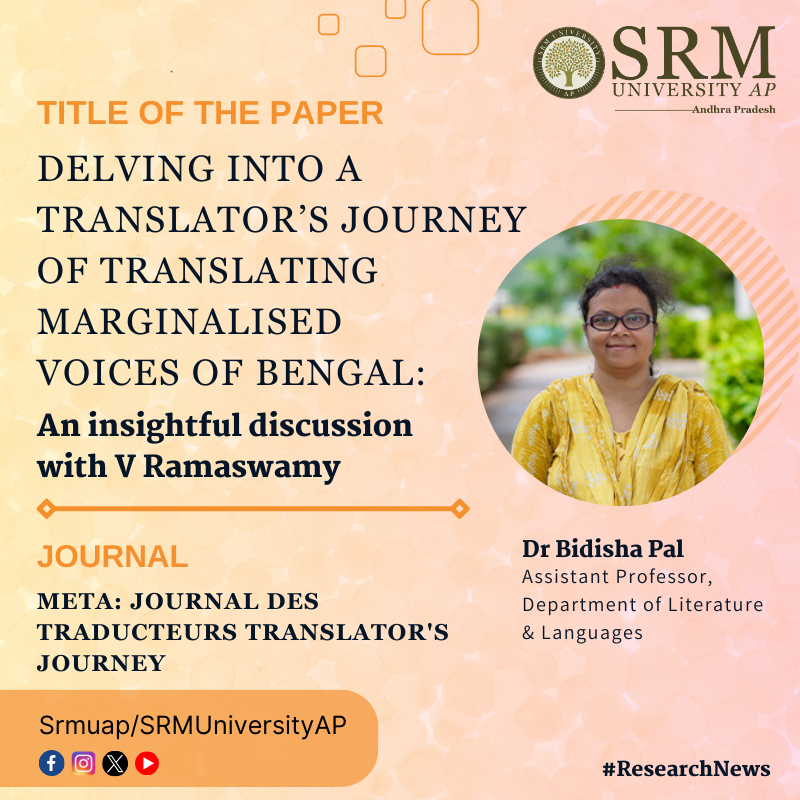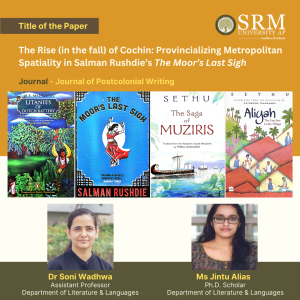- Tracing a Translator’s Journey: An Interview with V Ramaswamy March 13, 2024

A translated work must retain the essence and flavour of regional culture and locales. A good translator tries to reproduce the particularities that are ingrained within the texts. On this note, Dr Bidisha Pal, Assistant Professor from the Department of Literature and Languages, has published a paper, “Delving into a Translator’s Journey of Translating Marginalised Voices of Bengal: An Insightful Discussion with V Ramaswamy” in Meta Journal des traducteurs Translators’ Journal. This research revolves around a discussion with the well-known translator V Ramaswamy, a noted name in Bengali Dalit literature and translation. Ramaswamy shares his thoughts on working on the translation projects that he enjoys doing and that establish the cause of the marginalised people of Bengal.
Abstract
In this interview discussion with Bidisha Pal and Md. Mojibur Rahman, translator V Ramaswamy focuses on the journey of his translation and tryst with the marginalised Dalit voice(s) in Bengal. He speaks about the writings that propel him to choose translating and to carry voice(s) beyond the Bengal arena, thus dissolving language barriers. The deliberate choice to translate various pieces representing various periods acts as a witness to his existence as an independent translator. According to him, translation is also a source of healing to deal with a tragic past and the complicacies that life often presents to him. He shares his experience translating Subimal Mishra, the powerful poet who speaks for marginalised people. Ramaswamy, as he states in the interview, makes a vow to translate Mishra’s whole writing career. He talks about translating Manoranjan Byapari, a Bengali Dalit prize-winning author and political persona who has also championed the Dalit cause in Bengal, Adhir Biswas, the story-writer and publisher of a publishing house in Kolkata Gangchil that publishes writings by those literary personas who do not fall, as such, into the category of the mainstream, Bangladeshi writer Shahidul Zahir whose revolutionary voice and zeal reverberate in the literary world of Bangladesh, as well as Ansaruddin, a writer and farmer by profession whose works Ramaswamy is currently translating. Despite not being a part of the literary world, Ramaswamy has built an intense connection with literature and has gradually become part of the world. For him, translation is something that has to remain faithful to the source text, especially if people are doing literary translation.
Practical implementation/social implications of the research
The research contains elements that are connected with the values of the society. It discusses the nuances of translation of the writings of marginalised people, which contain many unforeseen truths of society, and depicts the struggles for the existence of the people. The translator is doing a commendable job compiling the writing thorough translation that will act as a bridge to the unfamiliar audience who could feel connected with the marginalised people.
Dr Bidisha aims to publish many more articles in the diverse interdisciplinary fields of literature, edit books, and attend conferences.
Continue reading → - Unveiling Literary Insights on Salman Rushdie’s The Moor’s Last Sigh March 11, 2024
 In a remarkable achievement, Dr Soni Wadhwa, Assistant Professor in the Department of Literature and Languages at SRM University-AP, and Ms Jintu Alias, a PhD Scholar, have made a significant contribution to the field of postcolonial studies with their paper titled “The rise (in the fall) of Cochin: Provincializing metropolitan spatiality in Salman Rushdie’s The Moor’s Last Sigh.”
In a remarkable achievement, Dr Soni Wadhwa, Assistant Professor in the Department of Literature and Languages at SRM University-AP, and Ms Jintu Alias, a PhD Scholar, have made a significant contribution to the field of postcolonial studies with their paper titled “The rise (in the fall) of Cochin: Provincializing metropolitan spatiality in Salman Rushdie’s The Moor’s Last Sigh.”The paper, published in the highly esteemed Journal of Postcolonial Writing offering a fresh perspective on Salman Rushdie’s acclaimed novel, “The Moor’s Last Sigh.” Through their insightful analysis, Dr Wadhwa and Alias challenge the conventional notions of metropolitan spatiality and provide a nuanced understanding of the provincial city of Cochin.
Dr Soni Wadhwa and Jintu Alias, a promising PhD Scholar, have meticulously analysed Rushdie’s The Moor’s Last Sigh, shedding light on the complex dynamics of metropolitan spatiality and the rise and fall of Cochin within the narrative.
Their research explores Rushdie’s portrayal of Cochin, challenging traditional notions of metropolitan spaces and offering a fresh perspective on the provincial nation of such spatialities. This groundbreaking analysis delves deep into the layers of cultural, historical, and socio-political contexts within Rushdie’s work, showcasing the authors’ keen insights and critical thinking.
The publication of this paper highlights the invaluable contributions of our faculty and scholars in the field of literature and postcolonial studies. It is a testament to the rigorous academic environment and the commitment to excellence fostered at SRM University-AP.
We extend our warmest congratulations to Dr Soni Wadhwa and Jintu Alias for their remarkable achievement. Their dedication to research and passion for exploring the nuances of literature continue to inspire us all.
Explanation of the Research in Layperson’s Terms
Bombay/Mumbai is a great city widely celebrated in literature, especially for its cosmopolitanism. Salman Rushdie’s novel The Moor’s Last Sigh has been read by various critics for the richness of the portrayal of Mumbai. In their research, PhD scholar Jintu Alias and her PhD supervisor Dr Soni Wadhwa have analysed the representation of Cochin in the novel. Regarding their research they say, “For very long, Cochin’s presence has been eclipsed by that of Mumbai. But there is more to the novel than Bombay’s history. Like any art or literature, this novel is open to multiple interpretations. Our study is focused on the depiction of space in postcolonial literature with a focus on the island city Cochin in Kerala. When we immersed ourselves into the novel, we found that its charm is irresistible. Rushdie primarily opened a new city for other writers to explore. This novel was followed by several more novels that took an even closer look at the history of Cochin (now Kochi).”
Abstract
Indian fiction and critical engagements with it have a metropolitan bias. The preference for representations of big cities such as Mumbai in fiction means that non-metropolitan (“provincial”) spaces in India face neglect, literary and otherwise. This article argues for provincialising Indian fiction by exploring non-metropolitan locations as imagined in works of fiction to unpack alternative spatiality. The example offered is Salman Rushdie’s The Moor’s Last Sigh. In most readings of the novel, Bombay (along with Moorish Spain) is highlighted as a metropolitan model for India. Cochin does not figure in these readings, which are passed over as if just a random background or setting for the characters to be launched into Mumbai. This article addresses Cochin’s marginalisation by investigating how the island city offers a provincial, alternative, non-metropolitan theorisation of spatialities in Indian fiction. The larger objective is to make space for similarly marginalised non-European locales in the discourse of cosmopolitanism.
Social Implications
- We hope that with this interpretation of the novel from the point of view of Cochin and its history and cosmopolitanism, smaller cities in India get more attention from literary critics.
- We also hope that our research excites further studies and creative writing on other aspects of cultural traditions practised in smaller cities in India. There are many more themes and historical and geographical settings to explore in Indian literature!
Future Research
In continuation of our method of reading different Kochi texts, we will engage with more novels in the future. Our previous reading of another Kochi novel was published in Modern Jewish Studies in September 2023. We look forward to strengthening this body of work in the future.
About This Collaboration
PhD scholar Ms Jintu Alias and Assistant Professor Dr Soni Wadhwa have been working on this area of the Kochi novel since May 2021. This has been an exciting spatiality project in the context of Indian literature.
Citation
Alias, J., & Wadhwa, S. (2024). The rise (in the fall) of Cochin: Provincializing metropolitan spatiality in Salman Rushdie’s The Moor’s Last Sigh. Journal of Postcolonial Writing, 1-13. https://doi.org/10.1080/17449855.2024.2307408
Continue reading →

